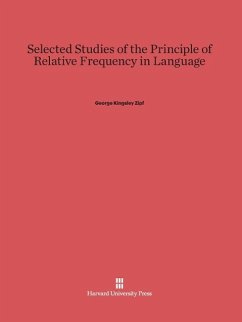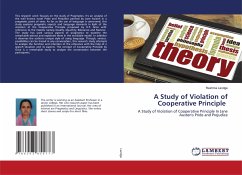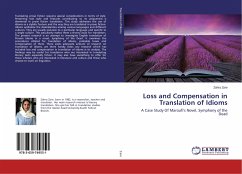
The Idiom Principle in L2 English
Assessing elusive formulaic sequences as indicators of idiomaticity, fluency, and proficiency
Versandkostenfrei!
Versandfertig in 6-10 Tagen
51,99 €
inkl. MwSt.

PAYBACK Punkte
26 °P sammeln!
Language acquisition is at the heart of this bookabout formulaic sequences , that is conventionalizedand memorized combinations of lexis and/or grammar,such as TAKE ADVANTAGE OF, COMMON KNOWLEDGE andIN ADDITION. Researchers have in the last couple ofdecades, increasingly focused on the large store ofand access to such sequences to account for thenatural fluency and idiomaticity typical of ournative language. The hypothesis of the present studyis that L2 learners of English just like nativespeakers predominantly use the idiom principle (cf.Sinclair 1991), which involves retrieving a memorizedla...
Language acquisition is at the heart of this book
about formulaic sequences , that is conventionalized
and memorized combinations of lexis and/or grammar,
such as TAKE ADVANTAGE OF, COMMON KNOWLEDGE and
IN ADDITION. Researchers have in the last couple of
decades, increasingly focused on the large store of
and access to such sequences to account for the
natural fluency and idiomaticity typical of our
native language. The hypothesis of the present study
is that L2 learners of English just like native
speakers predominantly use the idiom principle (cf.
Sinclair 1991), which involves retrieving a memorized
language sequence. Apart from providing a theoretical
background to the use and function of formulaic
language, this book compares intermediate learners
and native speakers use of formulaic language, with
a focus on written production of L2 English. The main
issues explored in the book are the quantity of
formulaic sequences, the mistakes in such sequences,
and the role of formulaic language in L2 proficiency.
These results are of interest to linguists, language
teachers, learners and others who are interested in
language acquisition.
about formulaic sequences , that is conventionalized
and memorized combinations of lexis and/or grammar,
such as TAKE ADVANTAGE OF, COMMON KNOWLEDGE and
IN ADDITION. Researchers have in the last couple of
decades, increasingly focused on the large store of
and access to such sequences to account for the
natural fluency and idiomaticity typical of our
native language. The hypothesis of the present study
is that L2 learners of English just like native
speakers predominantly use the idiom principle (cf.
Sinclair 1991), which involves retrieving a memorized
language sequence. Apart from providing a theoretical
background to the use and function of formulaic
language, this book compares intermediate learners
and native speakers use of formulaic language, with
a focus on written production of L2 English. The main
issues explored in the book are the quantity of
formulaic sequences, the mistakes in such sequences,
and the role of formulaic language in L2 proficiency.
These results are of interest to linguists, language
teachers, learners and others who are interested in
language acquisition.












